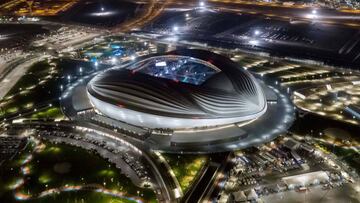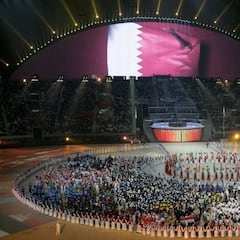Qatar 2022 stadiums meet environmental standards due to cooling systems
Saud Abdul-Ghani, the engineer responsible for the systems in Qatar's World Cup stadiums, explains the benefits of the air-cooling technology developed for the tournament.

Related stories
Saud Abdul-Ghani, the engineer responsible for the systems designed to provide Qatar's 2022 World Cup stadiums with air conditioning has affirmed that the new technology being utilised has given Qatar a distinct position and an advantage when it comes to trying to secure the rights to other international sporting events.
Qatar's 2022 stadiums are world-class arenas that also serve as a part of the government-owned infrastructure built up around them, which includes state-of-the-art airports, metro stations, hostelry sector services and entertainment, all of which will come into play as part of the country's Qatar National Vision 2030 development plan.
Qatar's priority is to provide stadiums that meet strict environmental standards with the aim of fostering cultural, social and economic benefits for the region and to add to the legacy of the 2022 World Cup by sharing the engineering feats that have been carried out with those interested in using them elsewhere across the world.
"The last edition of the Gulf Cup was a perfect opportunity for the football federations in the Gulf to see close up and benefit from the air conditioning systems in the stadiums," Abdul-Ghani said. "This was the reason that Qatar beat competition from the USA and Spain to host the World Athletics Championships in 2019, which because of the air conditioning technology available in the Al-Khalifa Stadium made Qatar the prime candidate to stage a championships where competitors broke world records. [The conditioning system] allowed many athletes to improve their performance levels and break records and this was an experience that was actually tailored for some competitors."
Qatar 2022's innovative air-conditioning idea
Speaking to Qatar daily Al-Arab, Abdul-Ghani continued: "The idea behind air-condioning the stadiums for the 2022 World Cup wasn't a coincidence or designed to ensure Qatar won the bid to host the tournament, the idea came about because developing the air-condioning technology provides a healthy environment for playing sports in general and the systems will also probably be used in other sectors like tourism and the farming and agriculture industry."
Abdul-Ghani also pointed to the benefits of haviing year-round air-conditioned facilities and that this would also mean that World Cup stadiums do not fall into disuse after the tournament. The systems will also help to place Qatar at the forefront of the regional sports sphere and give the country an advantage over its competitors when bidding to host international sporting events.
"There is a development plan for each stadium when the 2022 World Cup finishes," Abdul-Ghani concludes. "Given the high temperatures and humidity during much of the year, the cooling technology will need to be used to provide an agreeable climatic environment for spectators and players as well as keeping the pitches clean and free from fungi and other diseases."
The engineer also noted that Qatar has been looking at other methods for air cooling in stadiums that are not equipped with the conditioning technology such as the Ras Abu Aboud Stadium, where the design of the building itself will incorporate internal corridors to create air currents. Every stadium in the country will have its own personalised architectural design to incorporate all the different methods of air cooling into the structural planning.
